Tips to Overcome Learned Helplessness

Have you ever gotten to a point in your life where you said, “It is what it is”? Have you ever felt helplessness creep in?
You may be surprised to discover that “It is what it is” is one of the most common forms of learned helplessness. Let’s dive deep into the tips to overcome learned helplessness, but before that, what is it? I’d like you to look at these two scenarios.
Scenario 1

Source: Istock Photos
Thomas, an enthusiastic, middle-aged young man, lives in Kenya. He has voted for about three active regimes over the years. Each one had promised to be better than the last, but the cost of living kept increasing. The following voting season, he voted for another one, and nothing changed when they came into power. In fact, the issues were still the same, the problems didn’t end, and corruption was high.
The most ironic part is life became more difficult. The cost of living kept going higher and higher. Prices of commodities skyrocketed, and the government he trusted seemed like a joke. He thought things would be different if he voted for another regime, but it wasn’t so he felt powerless.
So what does Thomas do? He then decides that the system is corrupt and voting is a scam. He says that no matter what he does, nothing will change. Consequently, He stops voting.
Scenario 2

Istock Photos
Ann, a young lady, has a bad relationship with her father. Her father has been drinking for more than 20 years, basically years before she was born. As she grew up, she saw how his drinking escalated and affected their family. As a result, her parents separated, she had no relationship with her father, and there was a lot of dysfunction around her.
Ann talked to her father multiple times about how his drinking affected the family and how she cared for him. She called for “mikutanos”(meetings) and tried to discuss the issue, but it didn’t work.
Nothing changed. All these things were a cry for help. As the years passed, it was evident that Ann didn’t have a relationship with her father, but at this point, she was tired of trying and failing, so she decided to let things be.
She was going to get married and didn’t know how to go about it culturally. Even so, she didn’t have a relationship with her father, so she didn’t consult or reach out. As a matter of fact, she did things her way, and life went on.
Ann knew they had no relationship but felt she could do nothing about it. It was too far gone, too complicated, or too late to start now. She felt powerless and gave up trying to make a difference. To date, they have no relationship.
In both scenarios, what do Thomas and Ann have in common? Reflect on that.
Also, tell us in the comments, a scenario that left you feeling helpless too.

Istock photos
What is “Learned Helplessness?”
Learned helplessness is feeling powerless about changing a situation due to many unsuccessful attempts, thus doing nothing about it even when presented with an opportunity to change. In addition, it is a situation where you practically “give up” and let things be because you have no control. “It is what it is” kind of attitude.
Helplessness is a situation where you believe that nothing you will do matters. Or rather, the impact of the change will be second to none, so why waste your energy? You feel powerless and give up trying. You “learn” it because it is not usually your first automatic response.
The ‘learning’ is from doing it multiple times and getting no results, so you start thinking that you can’t do anything to change the situation and that you are helpless.
American Dictionary of Psychology defines it as a phenomenon caused by repeated exposure to a stressor, thus reducing motivation to alter the situation.
The Learned helplessness experiment.
Two psychologists first developed this phenomenon and tested it on dogs (Seligman & Maier, 1967). The experiment involved enclosing dogs in an area, exposing them to electric shocks on their collars over time, and watching their response. At first, they’d try and remove the collars, but as time went on, they gave up as if they realized they couldn’t do anything to change the shocks.
After some time, Seligman moved the same dogs to a partitioned cage. One side had an electrified base, and the other didn’t. He put the dogs on the electrified side and shocked them. To his surprise, they lay there and did nothing.
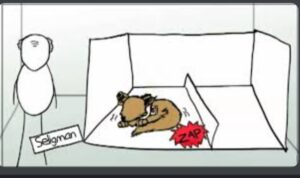
Source: EO Smith
He put other dogs that had never been exposed to the shocks before, and after shocking them once, they jumped to the other side of the partition. This experiment showed that the first dogs had learned that they couldn’t do anything to change their situation. In turn, they gave up trying, even when the opportunity presented itself.
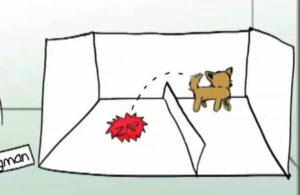
Source: EO Smith
How differently do you behave when you experience repeated stressors?
Tips to Overcome Learned Helplessness

Photo: Getty Images
We can link learned helplessness to mental health issues like anxiety and depression. Contrary to popular opinion, this is not a permanent mark or situation. Just like you learned helplessness, you can unlearn it. You may ask, how can you overcome learned helplessness? Here are some tips to overcome learned helplessness.
Therapy

Photo: Getty Images
Cognitive Behavioral Therapy
The most common treatment for this is therapy. Therapists use some techniques to deal with this, cognitive behavioral therapy being one. Through thought-challenging, you restructure your negative thoughts and beliefs and counter them with positive ones. You take back your power.
Exploration
Second, another technique we use is exploration which is done by catharses or, in other terms, venting. As we allow you to vent, share, and open up, you get to explore things hidden in your unconscious that need healing and dealing with.
You see the trauma, the stressors/shocks that changed your mindset and put you in depression and helplessness. As you deal with that, you unlearn powerlessness and endeavor to take action and handle what you can control.
Circle of Control
Third, you learn about your circle of influence and control. Who is the focus? What is within your control, and what is not? Where do you draw the line between what you can change and what you cannot be able to? Stephen Covey talks about it in his book, 7 Habits of Effective People
Goal Setting
Forth, you create SMART (Specific, Measurable, Attainable, Realistic, and Time-bound) goals from a healing point of view. You must have heard about SMART goals extensively over the years; in business, the workplace, finances, and what have you. The principle is similar; however, with the help of a professional, you narrow down to areas you didn’t know were worth looking into.
To work on your helplessness, your therapist guides you on making those goals and working on them step by step within specified parameters that focus on your emotional well-being. Furthermore, with our expertise, we see things from a different perspective.
Reinforcers
- Finally, you get to identify behaviors that reinforce and encourage this powerlessness. Your therapist walks with you to see them and helps you devise ways to overcome them so that they do not spill over to other aspects of your life, for example, your workplace and other relationships. Undoubtedly, this can escalate into a defense mechanism when dealing with your life stressors.
Stress Management

Photo: Istock
Another easy way to deal with learned helplessness is to learn how to deal with stress before it escalates. Some shared tips on; how to overcome learned helplessness are in my article on chronic stress. They include physical exercise, games, recreation, facing the issues head-on, setting and communicating boundaries, and mindful exercises like breathing exercises.
By healthily managing stress, you allow yourself to tackle the stressors one by one before they pile up and become difficult to deal with. Unlike handling them as they come, the repeated piled-up stressors become tough to maneuver, as a result, cause depression, anxiety, and, finally, learned helplessness.
Learned Optimism
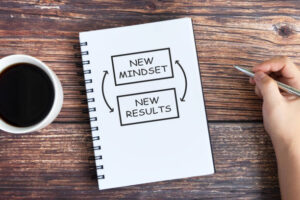
Source: Getty Images
It is a term that Seligman came up with as an opposite response to learned helplessness. It is a way to counter the negative thoughts of being powerless to create room for positive ones that you are powerful.
During this experiment, Seligman & Maier (1967) discovered that there were some outliers. Some dogs managed to jump into the other chamber despite being exposed to the earlier shocks. Essentially, this meant that some people can manage helplessness. As they studied their brains, they discovered that the dogs were not learning control.
The helplessness was a result of lacking control. Seligman, therefore, started looking at how the brain functions when it has a semblance of control. He discovered that when you are optimistic, you are in better control of the situation than when pessimistic. Dr. Seligman explores this extensively in his book, Learned Optimism: How to Change Your Mind and Your Life.
To sum up, learned helplessness can be overcome. It is an intentional walk but can be done by anyone and everyone willing to.
After reading this, what do you think you can do differently? Engage us in the comments.
How does Chronic Stress affect your Immune System?
Writer,
Sheila K. Muli
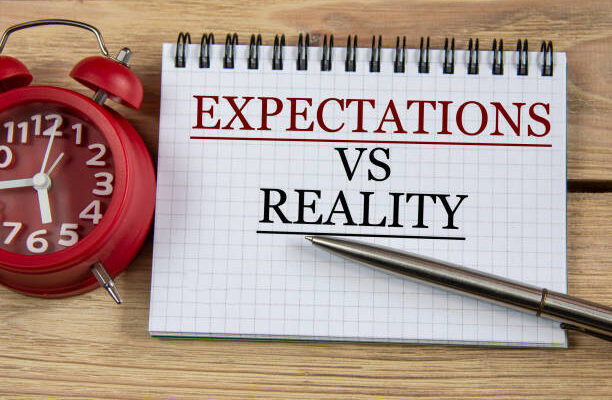








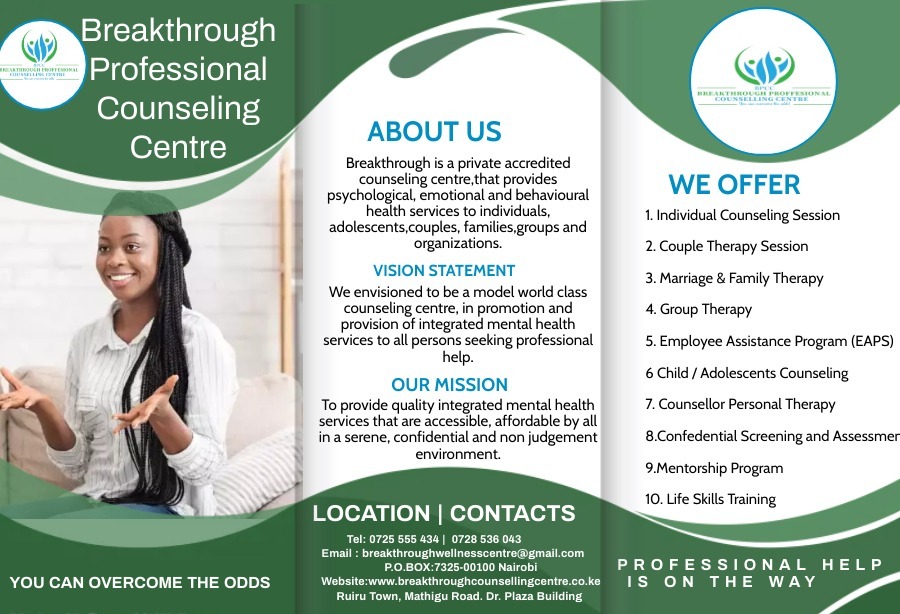
[…] with other people’s issues due to exposure to trauma, thus resulting in a lack of empathy, feeling helpless, numbness, and even burnout. In essence, you get tired when you need to be […]